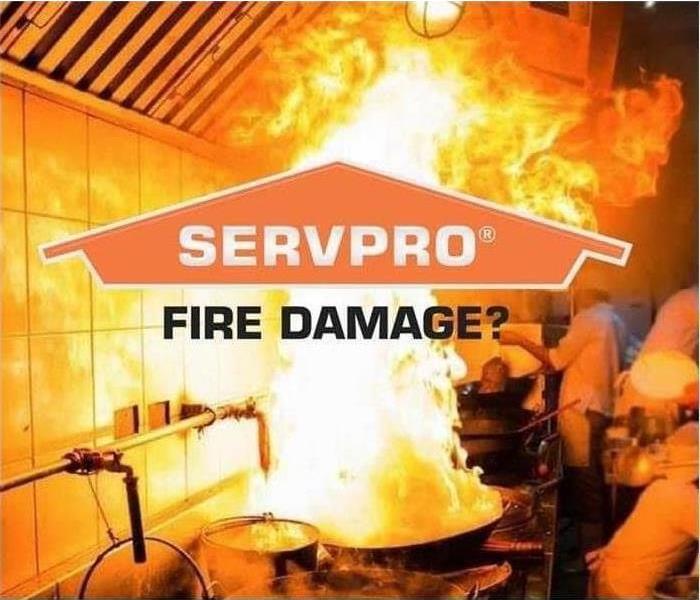Recent Fire Damage Posts
What Are The Different Types of Fire Damage?
11/29/2022 (Permalink)
Dealing with the damage from a fire can be a long process. The fire could have been small, but the smoke from it did the majority of the damage. On the other side, most of the damage could have been from the fire itself. Lastly, there could have been another layer of damage caused when the fire was extinguished. Here are the main types of fire damage that are commonly dealt with.
Flame Damage - This could be from an electrical outlet that caused damage, all the way to a full-blown kitchen fire.
Smoke Damage - Smoke is literally in the air and can (and will) get into everything. Even after the rebuild is completed, there can still be a lingering smell of smoke to the property unless it is dealt with correctly.
3rd Party Damage - This type of damage comes from any in-house sprinkler system used to put the fire out or from the Fire Department themselves when they get to the scene.
Heat Damage - Even though a part of the structure might have not actually caught fire, it was probably severely heated up. This can cause structural damage and possible swelling that you might not notice right away.
After a fire, you could be dealing with flame, smoke, water and heat damage at the same time. FEMA has some great information on what to do after the fire. The best way to make sure that this is taken care of promptly and properly is to contact the team at SERVPRO to get on the job!
Ways You Can Safely Use Candles In Your Home
9/13/2022 (Permalink)
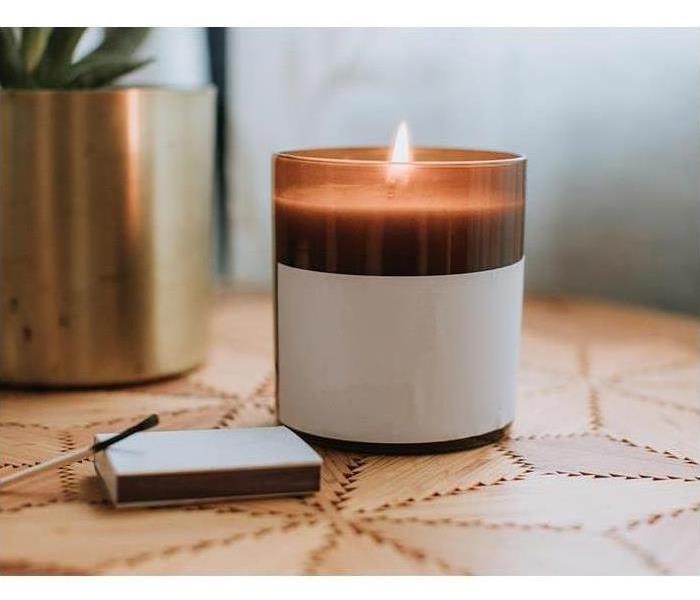 Call your local SERVPRO today!
662-349-6500
Call your local SERVPRO today!
662-349-6500
Avoid Candle Fires in your Home
With warm light and pleasant fragrances, candles can be an easy way to create the atmosphere that you want in your home. However, they can also become a safety hazard if not used properly. Candle fires are common, but the following tips can help you avoid them.
1. Never Leave Burning Candles Unattended
It may seem like an annoyance to extinguish a candle every time you leave the room. However, leaving it burning could result in a candle fire if something gets too close to the flame or if it burns too low. It is best to blow out candles before going to sleep as well, even if you are in the same room.
2. Always Keep Them Out of Reach of Pets and Children
Both children and pets often come with an excess of energy and curiosity. For this reason, it can be easy for them to inadvertently start a candle fire. Keep burning candles in an area that is not within reach, and do not leave them unsupervised.
3. Keep Them Away From Any Flammable Items
When you are using a candle, you should be sure to have the area free of flammable objects. This can include papers as well as fabrics such as curtains and bedding. These types of items should be at least a foot away from any candles that are in use. Flammable liquids should be kept even further away.
4. Use an Alternative to Candles
Perhaps the easiest way to prevent a fire is simply not to use candles at all. There are a variety of other ways that you can achieve a more relaxing home environment. If you are only interested in adding a pleasant scent to your home, a wax warmer is a great option. You can also buy battery-operated flameless candles that look and smell like the real thing.
While these tips can help you prevent an emergency, accidents can still occur. Whether it is small or large, fires often require smoke cleanup and some repairs. If this happens SERVPRO can help return your home to its previous condition.
Ways You Can Safely Use Candles In Your Home
9/1/2022 (Permalink)
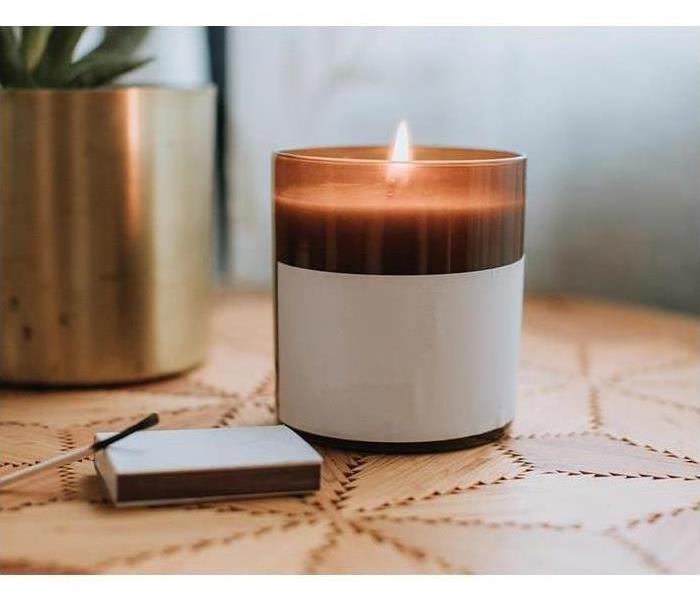 Call your local SERVPRO today!
Call your local SERVPRO today!
Avoid Candle Fires in your Home
With warm light and pleasant fragrances, candles can be an easy way to create the atmosphere that you want in your home. However, they can also become a safety hazard if not used properly. Candle fires are common, but the following tips can help you avoid them.
1. Never Leave Burning Candles Unattended
It may seem like an annoyance to extinguish a candle every time you leave the room. However, leaving it burning could result in a candle fire if something gets too close to the flame or if it burns too low. It is best to blow out candles before going to sleep as well, even if you are in the same room.
2. Always Keep Them Out of Reach of Pets and Children
Both children and pets often come with an excess of energy and curiosity. For this reason, it can be easy for them to inadvertently start a candle fire. Keep burning candles in an area that is not within reach, and do not leave them unsupervised.
3. Keep Them Away From Any Flammable Items
When you are using a candle, you should be sure to have the area free of flammable objects. This can include papers as well as fabrics such as curtains and bedding. These types of items should be at least a foot away from any candles that are in use. Flammable liquids should be kept even further away.
4. Use an Alternative to Candles
Perhaps the easiest way to prevent a fire is simply not to use candles at all. There are a variety of other ways that you can achieve a more relaxing home environment. If you are only interested in adding a pleasant scent to your home, a wax warmer is a great option. You can also buy battery-operated flameless candles that look and smell like the real thing.
While these tips can help you prevent an emergency, accidents can still occur. Whether it is small or large, fires often require smoke cleanup and some repairs. If this happens, SERVPRO can help return your home to its previous condition.
Fire Prevention
8/5/2022 (Permalink)
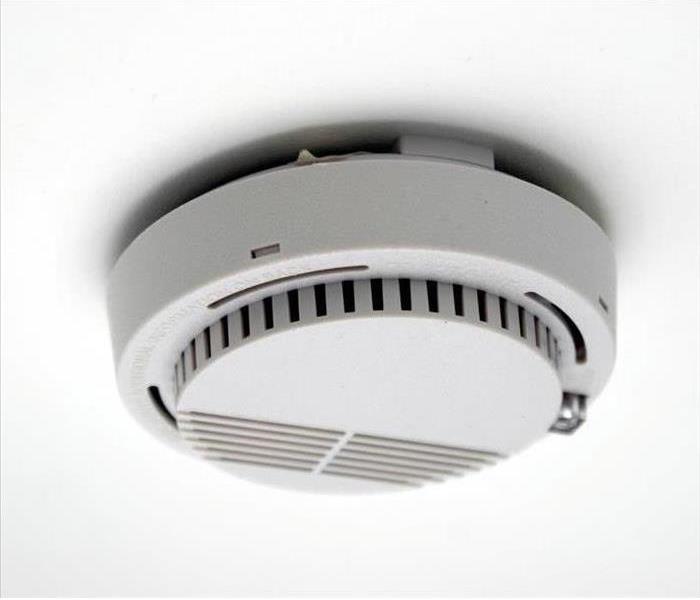 Call your local SERVPRO today!
662-349-6500
Call your local SERVPRO today!
662-349-6500
Safeguarding against potential fire hazards will significantly reduce the likelihood of a fire affecting your home and family. Make fire prevention and safety a priority in your home.
- Install a smoke alarm on every level of your home and test it monthly.
- Prevent electrical fires by never overloading circuits or extension cords.
- Use appliances only as directed by the manufacturer. Unplug appliances when not in use.
- Keep portable heaters at least three feet away from anything combustible.
- Keep the fire in the fireplace. Use fire screens and have your chimney cleaned annually.
- Install an affordable safety sprinkler system. In addition to keeping you safe, they can also increase property value and lower insurance rates.
- Plan your escape. Practice your exit strategy from every room in the house.
- Take the time to educate your children about the dangers of fire.
Types of Cleaning- For Your Fire Damaged Personal Property
8/4/2022 (Permalink)
 Call your SERVPRO today!
662-349-6500
Call your SERVPRO today!
662-349-6500
At SERVPRO, we use every method and tool in our inventory to restore everything possible after a fire occurs.
Cleaning Personal Property After Fire Damage
When possible, restoring a resident’s property after a fire is not just cost-efficient. It also helps lessen the personal loss to a family still dealing with watching that fire race through their home.
SERVPRO can restore most fire damage to the personal property of homeowners if flames did not heavily scorch it. Our teams use six methods to clean and restore personal property based on the type and level of damage, and the material that makes up the damaged item.
Wet Wiping
Technicians use this cleaning method for moderate-to-heavy soot and smoke residues. They use the same cloths and sponges, but also water or a mild cleaning solution. It is also our preferred choice for the property we cannot saturate with water or cleaners. In some cases, they use brushes for a better effect to remove much of the residues.
Dry Wiping
This is the first step our technicians take with almost every item. They use dusting cloths and sponges for dry surfaces with non-greasy, light-to-medium soot residues, usually a powder. If the layer of soil is very thick, they may use a commercial grade vacuum to remove it from the surface. Dry wiping is useful for other types of damage before our teams begin using other methods.
Foam Cleaning
This is similar to spray and wipe, but our teams use a pump-up bottle to force air into the liquid and apply foam. The method uses much less moisture while still applying a large amount of cleaning agent. It is our choice for cleaning upholstered furniture since too much liquid can cause the fabric to shrink and pull away from the frame.
Spray and Wipe
SERVPRO technicians use a spray bottle filled with water or a cleaner for more control over how much they use for cleaning an item. It is our first choice with curtains and drapes when there is a risk of the color fading, or running down the surface and onto carpets or floors.
Abrasive Cleaning
When the soot covers rough surfaces, like rock and marble, our technicians use a thicker cleaning agent and a variety of brushes to remove residues. For metal surfaces, they may have to use steel wool rather than a brush.
Immersion Cleaning
This is our choice for items with very thick residues and when other methods do not work. We immerse them in a tank containing water or a cleaning agent and then use sound waves to agitate the entire surface area with thousands of cleaning bubbles. It is exceptionally effective, even on items that absorbed a large number of residues over time.
Cleaning and restoring personal property is not a quick process. At SERVPRO, we use every method and tool in our inventory to restore everything possible after a fire.
Call your SERVPRO today!
662-349-6500
House Fire Preparedness
11/12/2021 (Permalink)
House fires are sudden and unexpected. Studies show that you may only have two minutes to escape from a home fire and get to safety, which does not seem like much time. However, Following these tips from the Red Cross will not only help you prevent house fires, but they will also help you prepare and make sure your family is safe if one ever does occur.
1. Get Rid of Fire Hazards
Identifying and taking the necessary precautions to ensure that you do not have fire hazards in your home is important. This means all electronic items that produce heat should always be at least three feet away from anything flammable. All space heaters and electric blankets should always be turned off when they are not being used.
2. Always Avoid Smoking in Bed
Smoking in bed is dangerous because of the possibility of hot ashes igniting your flammable bedding. It is also important to make sure all candles are put out when being left unattended.
3. Make Sure Your Children Are Informed
Talk to your children about the importance of not playing with lighters, matches, and fire. You can take an extra precautionary step by keeping all matches and lighters up high and out of reach or locked up in a place that your children cannot access.
4. Check Your Smoke Alarms
Be sure you have working smoke detectors on every floor of your home and on the inside and outside of every sleeping area. These should be checked monthly to ensure the batteries are working, and they should be replaces every 10 years.
5. Make a Plan
Discuss your outside meeting spot with your family and come up with an escape plan. This escape plan should be practiced at least twice a year, and you should make sure that every member of your family is able to escape in less than two minutes.
Fire Safety Tips
2/1/2021 (Permalink)
House fires are sudden and unexpected. Studies show that you may only have two minutes to escape from a home fire and get to safety, which does not seem like much time. However, Following these tips from the Red Cross will not only help you prevent house fires, but they will also help you prepare and make sure your family is safe if one ever does occur.
1. Get Rid of Fire Hazards
Identifying and taking the necessary precautions to ensure that you do not have fire hazards in your home is important. This means all electronic items that produce heat should always be at least three feet away from anything flammable. All space heaters and electric blankets should always be turned off when they are not being used.
2. Always Avoid Smoking in Bed
Smoking in bed is dangerous because of the possibility of hot ashes igniting your flammable bedding. It is also important to make sure all candles are put out when being left unattended.
3. Make Sure Your Children Are Informed
Talk to your children about the importance of not playing with lighters, matches, and fire. You can take an extra precautionary step by keeping all matches and lighters up high and out of reach or locked up in a place that your children cannot access.
4. Check Your Smoke Alarms
Be sure you have working smoke detectors on every floor of your home and on the inside and outside of every sleeping area. These should be checked monthly to ensure the batteries are working, and they should be replaces every 10 years.
5. Make a Plan
Discuss your outside meeting spot with your family and come up with an escape plan. This escape plan should be practiced at least twice a year, and you should make sure that every member of your family is able to escape in less than two minutes.
What to do when fire starts
2/1/2021 (Permalink)
Home Fire Preparedness: There are actually ways you can prepare your home for a fire. Here a few tips:
- Install the right number of smoke alarms. Smoke alarms should be installed on every level of your home, outside each sleeping area, and inside each sleeping room.
- Test your smoke alarms once a month. Change your batteries twice a year. We suggest changing them each time the time changes.
- Have a fire extinguisher in your home, especially in your kitchen.
- Teach your children what smoke alarms sound like and what that sound means.
- Ensure all household members know two ways to escape from every room of your home and know the family meeting spot outside of your home.
- Establish a family emergency communications plan and ensure that all household members know who to contact if they cannot find one another.
- Practice escaping from your home at least twice a year. Press the smoke alarm test button or yell "FIRE" to alert everyone that they must get out. Maybe do this when you put new batteries in the smoke alarms.
- Make sure everyone knows how to call 911.
- Teach household members how to STOP, DROP, and ROLL if their clothes should catch on fire.
What To Do if a Fire Starts:
- Know how to safely operate a fire extinguisher.
- Remember to GET OUT, STAY OUT, and CALL 911.
- Yell "FIRE" several times and go outside right away. If you live in a building with elevators, use the stairs. Leave all your things where they are and save yourself.
- If closed doors or handles are warm or smoke blocks your primary escape route, use your second way out. Never open doors that are warm to touch.
- If you must escape through smoke, get low and go under the smoke to your exit. Close doors behind you.
Recovering After a Fire:
- Call 911. Give first aid where needed; cool and cover burns to reduce the chance of further injury or infection.
- Let friends and family know you are safe.
- People and animals that are seriously injured or burned should be transported to professional medical or veterinary help immediately.
- Stay out of fire-damaged home until local fire authorities say it is safe to re-enter.
SERVPRO of Desoto, Tate, & Tunica Counties can also help you get your home and belongings back together after a fire. Call us today at 662-349-6500.
How to prevent fires in bedrooms
12/1/2020 (Permalink)
Did you know that half of all home fire deaths occur in bedrooms? That’s also where most electrical fires start too. However, you can easily prevent bedroom fires by following these essential safety tips:
- Don’t run electric cords under the bed or carpeting. Don’t trap cords against a wall where heat can build up. Keep cords untangled to allow heat to dissipate. Never overload an extension cord.
- Always supervise space heaters. Turn them off when leaving the bedroom or going to sleep.
- Install arc fault circuit interrupters (AFCIs) to prevent fires in electrical switches. They shut off the circuit when an unintentional discharge of electricity occurs in the circuit.
- Install tamper resistant receptacles (TRRs) in all rooms if you have children. These devices prevent them from inserting foreign objects like hairpins into the outlet.
- Never put devices that are charging under bedding. Leaving a laptop on the bed can also cause a fire.
- Only use laboratory-approved electric blankets and warmers. Don’t fold them as it may damage the wiring. Never sleep with an electric blanket turned on and regularly check it for overheating.
- Keep flammable objects at least three feet away from heat sources, such as space heaters, candles, and electronics.
- Keep lit candles away from combustible objects like bedding, curtains, and paper. Consider replacing burning candles with battery-operated flameless candles.
- Use only mattresses that meet the 2007 Federal Mattress Standards.
- Don’t smoke in bed — you might fall asleep with a lit cigarette in your hand and it could catch fire. Use fire-safe cigarettes as they extinguish more quickly.
- Install smoke alarms inside and outside each bedroom. Test Smoke Alarms monthly and replace them every 10 years. Replace batteries once a year.
- Create a fire escape plans. Make sure each room has two exits. Practice your home fire drill with everyone in the home at night and during the day twice a year.
For professional fire damage repair or smoke remediation services, contact SERVPRO of DeSoto, Tate, & Tunica Counties today at 662-349-6500.
Keep Fall fire free
10/13/2020 (Permalink)
The fall season brings cooler temperatures, beautiful colors, and an abundance of outdoor activities. But the season also brings many fire risks. Plan ahead this season to help ensure it is safe and fire-free.
Decorations
Fall decorations, like dried flowers, leaves and cornstalks, are highly flammable. Keep these and other decorations away from open flames and heat sources, including light bulbs and heaters. Since these items are dry, they can ignite very easily and spread flames quickly.
Have A Plan
Be sure you have a Fire Preparedness Plan and your family knows what to do if a fire breaks out in your home. Keep emergency exits clear of decorations so nothing blocks escape routes.
Protect your family by teaching your children to stay away from open flames. Be sure they know how to stop, drop, and roll if their clothing catches fire.
Ensure your smoke alarms are in working order and that you have an easily accessible fire extinguisher.
Make Halloween Safe
Remember safety first when choosing a Halloween costume. Consider avoiding billowing fabrics. If you are making your costume, choose material that won’t easily ignite if it comes into contact with heat or a flame.
It is safest to use a flashlight or battery-operated candle in a jack-o-lantern. Use extreme caution if using a real candle. Place lit pumpkins away from anything that can burn, and out of the way of doorsteps, walkways, and yards.
Be Careful in the Kitchen
With the holidays quickly approaching, your kitchen may be working on overdrive. While cooking, it can be easy to get distracted, especially if you have children. However, kitchens are a high-risk area for household fires, so it’s important to remain watchful.
Never leave food unattended while cooking, especially working with oil. Hot grease can splash and ignite. Keep flammable objects, like washcloths, potholders, and paper towels, away from the stovetop.
If a fire starts in your oven, keep the door closed. Turn it off and wait for the fire to extinguish.
Safely Use Your Fireplace
As the weather turns cold and brisk,fireplaces can bring a warm and inviting atmosphere to any home. However, if fireplaces are not properly cared for, they can lead to an increased fire and smoke risk. Make sure your fireplace is clean and well maintained and never left unattended when lit.
While you can take precautions to prevent fires this fall, sometimes accidents happen. If your home suffers any fire or smoke damage, call SERVPRO of Desoto, Tate, & Tunica Counties.
After smoke or fire damages a home, it’s important to get it fixed as soon as possible. Call us at 662-349-6500, and we’ll assess the damage and make your home “Like it never even happened.”
What to do when fire starts...
10/10/2019 (Permalink)
Home Fire Preparedness: There are actually ways you can prepare your home for a fire. Here a few tips:
- Install the right number of smoke alarms. Smoke alarms should be installed on every level of your home, outside each sleeping area, and inside each sleeping room.
- Test your smoke alarms once a month. Change your batteries twice a year. We suggest changing them each time the time changes.
- Have a fire extinguisher in your home, especially in your kitchen.
- Teach your children what smoke alarms sound like and what that sound means.
- Ensure all household members know two ways to escape from every room of your home and know the family meeting spot outside of your home.
- Establish a family emergency communications plan and ensure that all household members know who to contact if they cannot find one another.
- Practice escaping from your home at least twice a year. Press the smoke alarm test button or yell "FIRE" to alert everyone that they must get out. Maybe do this when you put new batteries in the smoke alarms.
- Make sure everyone knows how to call 911.
- Teach household members how to STOP, DROP, and ROLL if their clothes should catch on fire.
What To Do if a Fire Starts:
- Know how to safely operate a fire extinguisher.
- Remember to GET OUT, STAY OUT, and CALL 911.
- Yell "FIRE" several times and go outside right away. If you live in a building with elevators, use the stairs. Leave all your things where they are and save yourself.
- If closed doors or handles are warm or smoke blocks your primary escape route, use your second way out. Never open doors that are warm to touch.
- If you must escape through smoke, get low and go under the smoke to your exit. Close doors behind you.
Recovering After a Fire:
- Call 911. Give first aid where needed; cool and cover burns to reduce the chance of further injury or infection.
- Let friends and family know you are safe.
- People and animals that are seriously injured or burned should be transported to professional medical or veterinary help immediately.
- Stay out of fire-damaged home until local fire authorities say it is safe to re-enter.
SERVPRO of Desoto, Tate, & Tunica Counties can also help you get your home and belongings back together after a fire. Call us today at 662-349-6500.
Fire safety tips
10/10/2019 (Permalink)
House fires are sudden and unexpected. Studies show that you may only have two minutes to escape from a home fire and get to safety, which does not seem like much time. However, Following these tips from the Red Cross will not only help you prevent house fires, but they will also help you prepare and make sure your family is safe if one ever does occur.
1. Get Rid of Fire Hazards
Identifying and taking the necessary precautions to ensure that you do not have fire hazards in your home is important. This means all electronic items that produce heat should always be at least three feet away from anything flammable. All space heaters and electric blankets should always be turned off when they are not being used.
2. Always Avoid Smoking in Bed
Smoking in bed is dangerous because of the possibility of hot ashes igniting your flammable bedding. It is also important to make sure all candles are put out when being left unattended.
3. Make Sure Your Children Are Informed
Talk to your children about the importance of not playing with lighters, matches, and fire. You can take an extra precautionary step by keeping all matches and lighters up high and out of reach or locked up in a place that your children cannot access.
4. Check Your Smoke Alarms
Be sure you have working smoke detectors on every floor of your home and on the inside and outside of every sleeping area. These should be checked monthly to ensure the batteries are working, and they should be replaces every 10 years.
5. Make a Plan
Discuss your outside meeting spot with your family and come up with an escape plan. This escape plan should be practiced at least twice a year, and you should make sure that every member of your family is able to escape in less than two minutes.
Keep Fall fire free
10/8/2019 (Permalink)
The fall season brings cooler temperatures, beautiful colors, and an abundance of outdoor activities. But the season also brings many fire risks. Plan ahead this season to help ensure it is safe and fire-free.
Decorations
Fall decorations, like dried flowers, leaves and cornstalks, are highly flammable. Keep these and other decorations away from open flames and heat sources, including light bulbs and heaters. Since these items are dry, they can ignite very easily and spread flames quickly.
Have A Plan
Be sure you have a Fire Preparedness Plan and your family knows what to do if a fire breaks out in your home. Keep emergency exits clear of decorations so nothing blocks escape routes.
Protect your family by teaching your children to stay away from open flames. Be sure they know how to stop, drop, and roll if their clothing catches fire.
Ensure your smoke alarms are in working order and that you have an easily accessible fire extinguisher.
Make Halloween Safe
Remember safety first when choosing a Halloween costume. Consider avoiding billowing fabrics. If you are making your costume, choose material that won’t easily ignite if it comes into contact with heat or a flame.
It is safest to use a flashlight or battery-operated candle in a jack-o-lantern. Use extreme caution if using a real candle. Place lit pumpkins away from anything that can burn, and out of the way of doorsteps, walkways, and yards.
Be Careful in the Kitchen
With the holidays quickly approaching, your kitchen may be working on overdrive. While cooking, it can be easy to get distracted, especially if you have children. However, kitchens are a high-risk area for household fires, so it’s important to remain watchful.
Never leave food unattended while cooking, especially working with oil. Hot grease can splash and ignite. Keep flammable objects, like washcloths, potholders, and paper towels, away from the stovetop.
If a fire starts in your oven, keep the door closed. Turn it off and wait for the fire to extinguish.
Safely Use Your Fireplace
As the weather turns cold and brisk,fireplaces can bring a warm and inviting atmosphere to any home. However, if fireplaces are not properly cared for, they can lead to an increased fire and smoke risk. Make sure your fireplace is clean and well maintained and never left unattended when lit.
While you can take precautions to prevent fires this fall, sometimes accidents happen. If your home suffers any fire or smoke damage, call SERVPRO of Desoto, Tate, & Tunica Counties.
After smoke or fire damages a home, it’s important to get it fixed as soon as possible. Call us at 662-349-6500, and we’ll assess the damage and make your home “Like it never even happened.”
Fire Restoration Walk-Through
9/13/2019 (Permalink)
No matter how the fire started, a rush of emotions and feelings of panic seem to follow. After the calling the Fire Department to put out the fire, who do you call to help you clean up the damage caused by the fire?
SERVPRO of DeSoto, Tate & Tunica Counties is here to help you any time, day or night. Here is an overview of our fire damage process:
ONE HOUR: Within one hour from notice of loss, SERVPRO of DeSoto, Tate and Tunica Counties will contact you to arrange for service. You'll know help is on the way!
FOUR HOURS: Within four hours of loss notificiation, SERVPRO of DeSoto, Tate & Tunica Counties will be on-site to start mitigation services. The key to reducing damage and saving money is responding quickly to your damage.
DETAILED EXPLANATION: A trained, uniformed and equipped SERVPRO of DeSoto, Tate & Tunica Counties professional will walk you through the job process step-by-step, explaining what to expect and anticipated outcome.
PRETESTING: We will begin pretesting for restorability, working from the source of the damage outward.
EIGHT HOURS: Within eight business hours of on-site arrival, a verbal briefing of the scope will be communicated to the appropriate person, normally your adjuster or property manager.
CLEANING, RESTORATION, & DEODORIZATION: We will work neatly and efficiently to help you regain control of your property when a damaging event has taken over. They will use state-of-the-art restoration techniques to ensure your property is taken care of right the first time.
FINAL WALK-THROUGH: After the work has been completed, a final walk through will be conducted with your to help ensure your satisfaction.
Call us today at SERVPRO of DeSoto, Tate & Tunica Counties at (662) 349-6500 for all of your fire restoration needs.
Fire Extinguisher Safety
9/11/2019 (Permalink)
Ensuring your home has at least one working fire extinguisher is one of the first steps toward fire preparedness. However, these important tools can come in a variety of styles. Here are a few tips for choosing the right extinguisher for your home.
1. Consider the Chemical Rating
Many extinguishers include an A, B or C rating to help you know which home fire type it is rated for. The A rating is used for dry combustible materials such as paper or wood, while the B rating indicates effectiveness against flammable liquids. Both of these ratings should have a number after the letter. These numbers indicate the effectiveness level with higher numbers being more effective than lower. The C rating indicates that the extinguisher materials are non-conductive, and may be used in the event of an electrical fire. There is no numeral indicator for C ratings.
2. Look at the Valve Type
There are two types of valves your fire extinguisher may come with. A plastic valve indicates the extinguisher is disposable and will need to be replaced after time or after being used. A metal valve is used for refilling the tank when the pressure gets low over an extended period of time, or after use. Most extinguishers include a gauge to help you determine when a refill may be necessary.
3. Keep the Size in Mind
Extinguishers can come in a variety of sizes. The size you choose may depend on the location it is intended for. Large extinguishers should be kept in areas where a fire may grow quickly, while small to medium extinguishers are best for quick grab situations. In all cases you should know how to properly use your fire extinguisher and follow proper fire safety protocols.
Whatever type of fire extinguisher you choose, remember to read the instructions for its use. It’s also important to keep your extinguisher in working order by checking the pressure and age readings, and having your extinguisher refilled or replaced when needed.
For professional fire damage repair or smoke remediation services, contact SERVPRO of DeSoto, Tate & Tunica Counties today at 662-349-6500.
Carbon Monoxide Safety
3/28/2019 (Permalink)
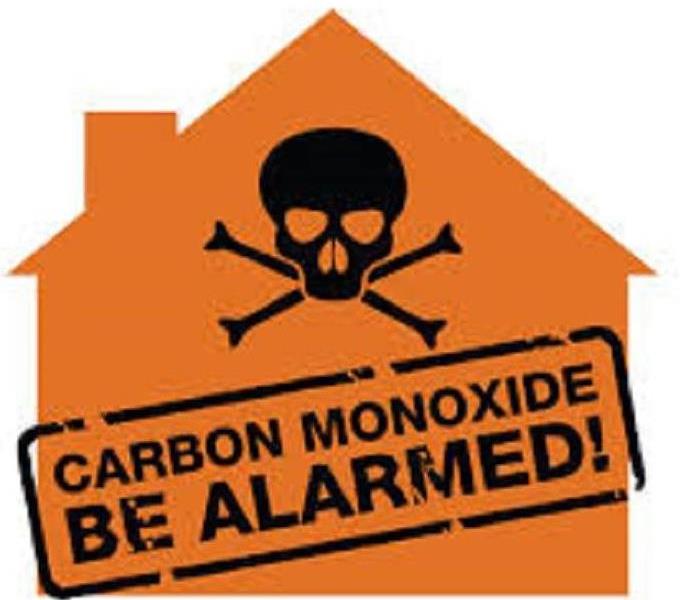 Always be cautious and aware of the dangers of Carbon Monoxide.
Always be cautious and aware of the dangers of Carbon Monoxide.
You can’t see or smell carbon monoxide, but at high levels, it can kill a person in minutes. Often called the silent killer, carbon monoxide, or CO, is an invisible, odorless, colorless gas, created when fuels, like gasoline, wood, coal, natural gas and propane burn incompletely.
According to the Center for Disease Control and Prevention (CDC), each year more than 400 Americans die from unintentional CO poisoning. It is estimated another 20,000 visit the emergency room, and more than 4,000 are hospitalized due to CO poisoning. All people and animals are at risk for CO poisoning, with some groups— including unborn babies, infants, and people with chronic heart disease, anemia, or respiratory problems— being more susceptible to the effects of carbon monoxide.
An excess of CO, leading to CO poisoning, can result from faulty furnaces or other heating appliances, portable generators, water heaters, clothes dryers, or idling cars left running in garages.
Taking some basic, precautionary steps can help eliminate the risk of carbon monoxide poisoning. Protect yourself by reviewing the following tips, provided by the United States Fire Administration.
- Have fuel-burning appliances, like oil and gas furnaces, gas or kerosene heaters, fireplaces, and wood stoves inspected by a trained professional every year.
- Open the damper for proper ventilation before using a fireplace. Never use your oven or stovetop to heat your home.
- Make sure all fuel-burning vented equipment is vented to the outside to avoid CO poisoning. Keep the venting for exhaust clear and unblocked.
- If you need to warm a vehicle, remove it from the garage immediately after starting it. Never run a vehicle or other fueled engine or motor indoors, even if garage doors are open. Make sure the exhaust pipe of a running vehicle is not blocked with snow, ice, or other materials.
- Make sure vents for the dryer, furnace, stove, and fireplace are clear of snow and other debris.
- Only use barbecue grills outside, away from all doors, windows, vents, and other building openings. Some grills can produce CO gas. Never use grills inside the home or the garage, even if the doors are open.
- Use portable generators outdoors in well-ventilated areas away from all doors, windows, vents, and other building openings to prevent exhaust fumes from entering the home.
The following are signs that you might be experiencing CO poisoning. Symptoms of CO poisoning include:
- Dull headache
- Weakness
- Dizziness
- Nausea or vomiting
- Shortness of breath
- Confusion
- Blurred vision
- Loss of consciousness
Take precautions to prevent CO poisoning in your home.
Keep Fall Fire Free
10/9/2018 (Permalink)
 SERVPRO of Desoto, Tate, & Tunica Counties is here to help 24/7. Call us whatever your fire, mold, or water needs may be. 662-349-6500
SERVPRO of Desoto, Tate, & Tunica Counties is here to help 24/7. Call us whatever your fire, mold, or water needs may be. 662-349-6500
The fall season brings cooler temperatures, beautiful colors, and an abundance of outdoor activities. But the season also brings many fire risks. Plan ahead this season to help ensure it is safe and fire-free.
Decorations
Fall decorations, like dried flowers, leaves and cornstalks, are highly flammable. Keep these and other decorations away from open flames and heat sources, including light bulbs and heaters. Since these items are dry, they can ignite very easily and spread flames quickly.
Have A Plan
Be sure you have a Fire Preparedness Plan and your family knows what to do if a fire breaks out in your home. Keep emergency exits clear of decorations so nothing blocks escape routes.
Protect your family by teaching your children to stay away from open flames. Be sure they know how to stop, drop, and roll if their clothing catches fire.
Ensure your smoke alarms are in working order and that you have an easily accessible fire extinguisher.
Make Halloween Safe
Remember safety first when choosing a Halloween costume. Consider avoiding billowing fabrics. If you are making your costume, choose material that won’t easily ignite if it comes into contact with heat or a flame.
It is safest to use a flashlight or battery-operated candle in a jack-o-lantern. Use extreme caution if using a real candle. Place lit pumpkins away from anything that can burn, and out of the way of doorsteps, walkways, and yards.
Be Careful in the Kitchen
With the holidays quickly approaching, your kitchen may be working on overdrive. While cooking, it can be easy to get distracted, especially if you have children. However, kitchens are a high-risk area for household fires, so it’s important to remain watchful.
Never leave food unattended while cooking, especially working with oil. Hot grease can splash and ignite. Keep flammable objects, like washcloths, potholders, and paper towels, away from the stovetop.
If a fire starts in your oven, keep the door closed. Turn it off and wait for the fire to extinguish.
Safely Use Your Fireplace
As the weather turns cold and brisk,fireplaces can bring a warm and inviting atmosphere to any home. However, if fireplaces are not properly cared for, they can lead to an increased fire and smoke risk. Make sure your fireplace is clean and well maintained and never left unattended when lit.
While you can take precautions to prevent fires this fall, sometimes accidents happen. If your home suffers any fire or smoke damage, call SERVPRO of Desoto, Tate, & Tunica Counties.
After smoke or fire damages a home, it’s important to get it fixed as soon as possible. Call us at 662-349-6500, and we’ll assess the damage and make your home “Like it never even happened.”
Fire Damage: Restoration vs Replace
8/13/2018 (Permalink)
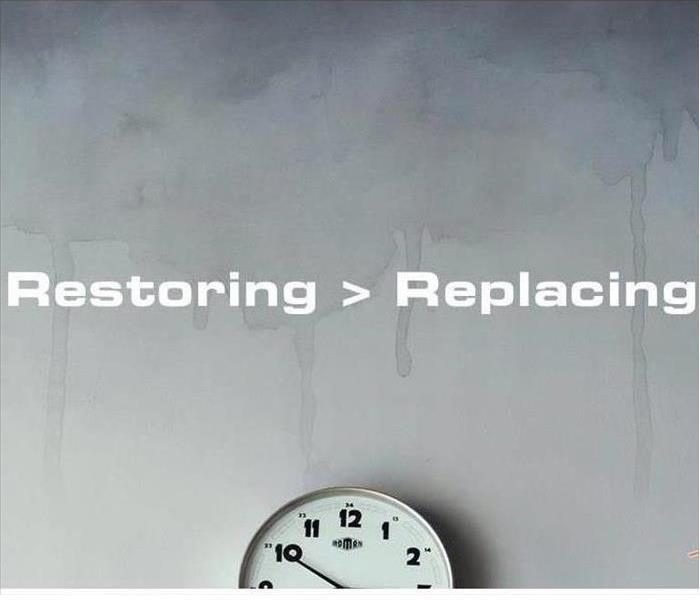 Let the professionals at SERVPRO of Desoto, Tate, & Tunica Counties handle your fire damage today. 662-349-6500. We are always here to help!
Let the professionals at SERVPRO of Desoto, Tate, & Tunica Counties handle your fire damage today. 662-349-6500. We are always here to help!
The first 48 hours after fire damage occurs can make the difference between restoring versus replacing your property and personal belongings. SERVPRO of Desoto, Tate, & Tunica Counties can help prevent fire damage from creating long-term problems. Our trained professionals provide timely response with mitigation services ranging from fire, smoke and soot removal to contents claims inventory and document restoration. These services help ensure your property, belongings and memories are restored to preloss condition when possible.
A back draft of emotions often sweeps over the homeowners after a fire ravages a home. Fear, uncertainty, stress and doubt about the future of the property can overwhelm the homeowner long after the flames have been extinguished and the smoke has cleared.
After the first wave of heroes have rescued the property, let SERVPRO of Desoto, Tate, & Tunica Counties help you restore it.
So, before you risk doing further damage by attempting to clean up the damage yourself, call us today 662-349-6500.
Fire Safety Tips
7/9/2018 (Permalink)
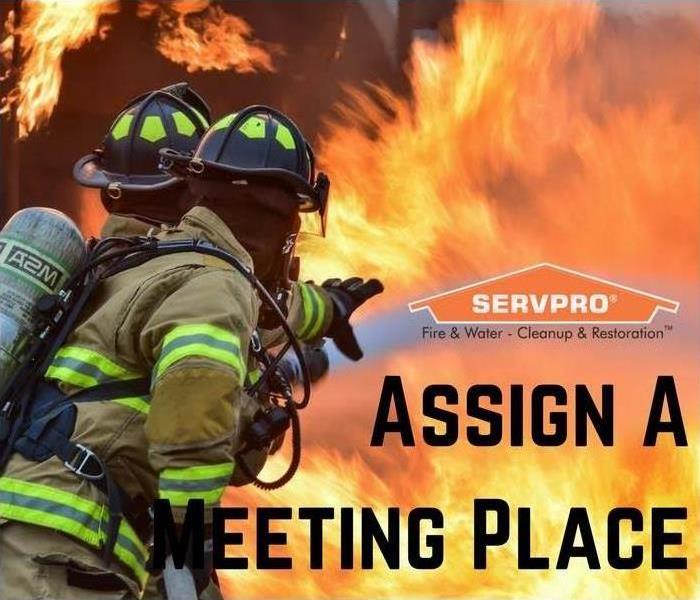 You can never be too prepared. SERVPRO of Desoto, Tate, & Tunica Counties is always here to help! 662-349-6500
You can never be too prepared. SERVPRO of Desoto, Tate, & Tunica Counties is always here to help! 662-349-6500
House Fire Prevention TipsHouse fires are sudden and unexpected. Studies show that you may only have two minutes to escape from a home fire and get to safety, which does not seem like much time. However, Following these tips from the Red Cross will not only help you prevent house fires, but they will also help you prepare and make sure your family is safe if one ever does occur.
1. Get Rid of Fire Hazards
Identifying and taking the necessary precautions to ensure that you do not have fire hazards in your home is important. This means all electronic items that produce heat should always be at least three feet away from anything flammable. All space heaters and electric blankets should always be turned off when they are not being used.
2. Always Avoid Smoking in Bed
Smoking in bed is dangerous because of the possibility of hot ashes igniting your flammable bedding. It is also important to make sure all candles are put out when being left unattended.
3. Make Sure Your Children Are Informed
Talk to your children about the importance of not playing with lighters, matches, and fire. You can take an extra precautionary step by keeping all matches and lighters up high and out of reach or locked up in a place that your children cannot access.
4. Check Your Smoke Alarms
Be sure you have working smoke detectors on every floor of your home and on the inside and outside of every sleeping area. These should be checked monthly to ensure the batteries are working, and they should be replaces every 10 years.
5. Make a Plan
Discuss your outside meeting spot with your family and come up with an escape plan. This escape plan should be practiced at least twice a year, and you should make sure that every member of your family is able to escape in less than two minutes.
Restoring Documents After a Fire Damage
6/13/2018 (Permalink)
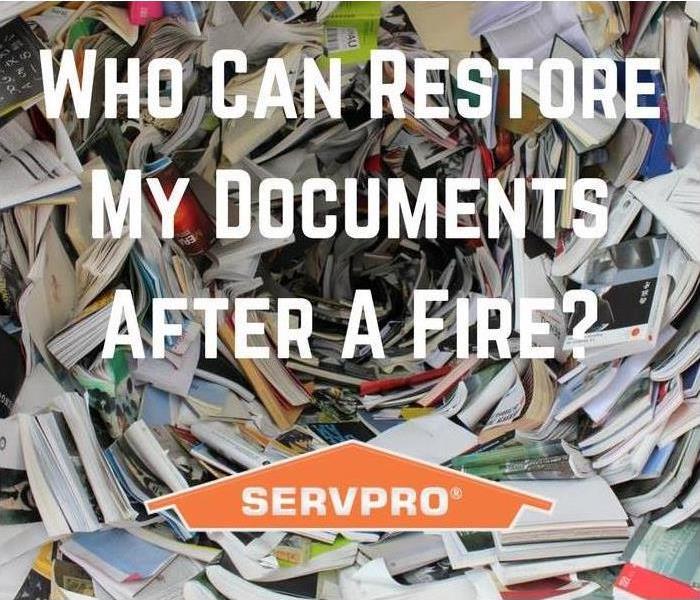 Let the professionals at SERVPRO of Desoto, Tate, & Tunica Counties help with all of your fire restoration needs. Call us today at 662-349-6500
Let the professionals at SERVPRO of Desoto, Tate, & Tunica Counties help with all of your fire restoration needs. Call us today at 662-349-6500
Fires are devastating in many ways, and they can destroy valuable items in your home or office. You may worry about important documents, such as birth certificates and social security cards. Knowing some important about document restoration can help you to restore those items in the event of a fire.
Take Precautions
Taking precautionary measures can better prepare your valuable items for document restoration. For example, you could store them in a fireproof box. In the event that they experience some damage, possibly because of a hole in the box, restoring them would likely be more of a possibility. You should also keep them together so that you don't waste valuable time trying to locate them after a fire.
Call Early
If you wait too long to call SERVPRO of Desoto, Tate, & Tunica Counties, you may discover that it is too late to perform full fire restoration services when it comes to your documents. Recovering from a fire is often tremendously difficult, and you may not want to think more about the incident. However, by taking the time to call early, you can allow your family and home to start to heal.
Ask for Instructions
When you are on the phone booking an appointment with the professionals, ask if you should do anything to better preserve your documents. For example, if you touch damaged documents, the paper might crumble. The team may advise you to leave the documents exactly where they are, or you may receive instructions to handle them in a certain manner.
Maintain Realistic Expectations
In the event that an important document was seriously damaged, you may have high hopes that it will be restored. Keep in mind that an evaluation of the situation is one of the first steps. If the documents have been completely burned in the fire, restoring them might prove impossible.
Create a List of Resources
Before a damaging event takes place, work to create a list of resources with which you can consult in the event that the documents are beyond repair. For example, you can find out what entity to contact if you lose your social security card or birth certificate in the fire
Fires provoke fear in many people. You likely have your own anxieties about fires. One of these fears may relate to the potential destruction of documents. Fortunately, you have options if you think your documents have been ruined; you can call to inquire about restoration.
Fire Safety Tip: Keep Your Dryer Vent Clean
6/13/2018 (Permalink)
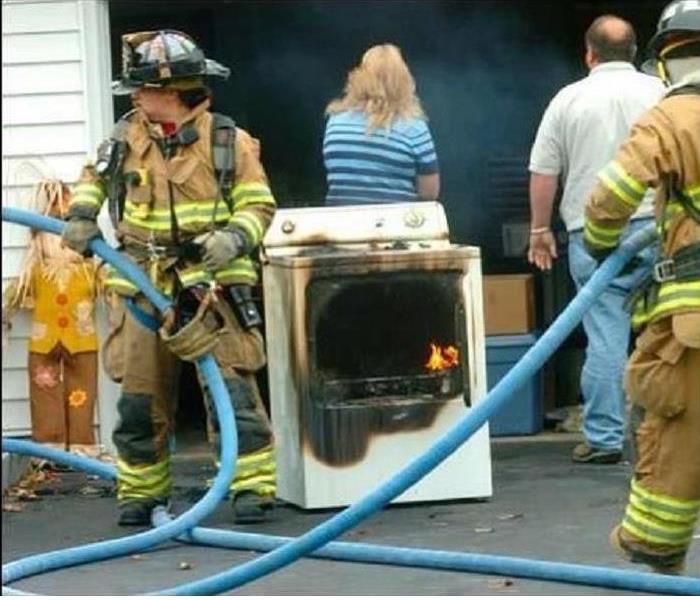 Clean your dryer vent after each load!
Clean your dryer vent after each load!
It may surprise you to learn that one of the leading causes of home fires is your dryer vent. When your dryer vent becomes clogged with lint, it is susceptible to catching fire. That can result in plenty of costly fire damage to your home.
There's a reason why clothes dryer fires are so common. Lint is actually extremely combustible. When it accumulates in your dryer, and the heat from drying comes in contact with it, it's little surprise that this material occasionally bursts into flame. Keep your lint trap clean!
However, this isn't the only way to reduce the possibility of a clothes dryer fire. You also need to check your dryer's vent hose. Make sure the hose is aluminum, and that it is not kinked or crushed. If the flow of hot air is obstructed, you'll boost the chances of a fire. You should also clean your vent line often. Lint can accumulate inside the hose, and that can also increase the likelihood of a fire. If you can't clean the hose on your own, hire a contractor to tackle this job.
Keep the area around your dryer clean. If your dryer does start a fire, you want that fire to spread as slowly as possible. Keeping boxes, clothing and other items away from your dryer will help keep any fire contained.
If you do suffer a dryer fire, know that you can call on the professionals at SERVPRO of Desoto, Tate, & Tunica Counties. We can help with fire restoration efforts and with cleaning up the results of fire damage.
No one wants to suffer any type of fire. A fire that is as easily preventable as a clothes dryer fire, though, can be particularly upsetting. Make sure to keep your dryer's vents and lint trap clean to avoid these costly fires.
When Fire Damage Affects You
3/28/2018 (Permalink)
 Fires can cause much damage to your home or business...but SERVPRO of Desoto, Tate, & Tunica Counties can make it "Like it never even happened."
Fires can cause much damage to your home or business...but SERVPRO of Desoto, Tate, & Tunica Counties can make it "Like it never even happened."
SERVPRO of Desoto, Tate, & Tunica Counties can help you in so many ways if you are a victim of a fire damage in your home or business.
What is Restorable:
Determining exactly what can be saved until everything is dry is usually impossible. We will set a follow-up date so we can monitor the drying process. In addition, the restoration process will be scheduled when the drying is complete. The can include floor preparation, tack strip replacements, carpet and pad installation, seaming, carpet cleaning and restoring, and furniture and contents cleaning. A scope of services will be provided.
Pre-Existing or Preloss Conditions:
During the course of cleaning, it is likely we will remove day-to-day soiling, which existed prior to your loss. We are happy to do so. If, however, the removal of pre-existing soil requires significant extra effort, our crews will be instructed to move on to the next item. Pre-existing damage, including visible mold growth, will also be noted.
Personal Items:
In the course of our survey and cleaning, we will sometimes be required to open doors, cupboards, etc. to qualify and/or restore the damage. If any of these areas contain personal items you would prefer to relocate before we start work, please let us know.
Overlooked Items:
Although our supervisors inspect all work, you should accompany the supervisor on the final walk-through and bring any overlooked items or concerns to the supervisor's attention.
Insurance Adjusters or Agents:
We are neither insurance agents nor adjusters. We cannot authorize anything to be replaced, repaired or painted. Our job is to preserve and protect, stop further damage from occurring and restore damaged items to their prior condition when possible.
Please call SERVPRO of Desoto, Tate, & Tunica Counties 24/7 in any Fire or Water Emergency at 662-349-6500.
What to do Before, During, & After a Fire
3/28/2018 (Permalink)
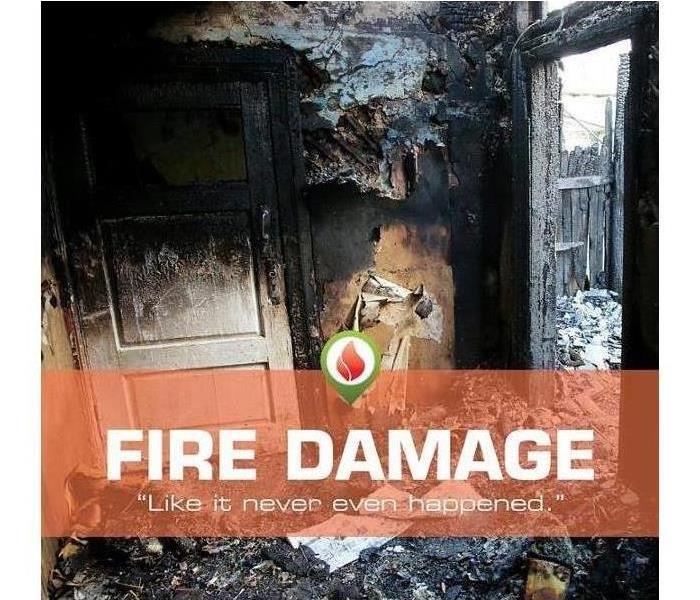 Fires can be a very dangerous and emotional thing...please let us at SERVPRO of Desoto, Tate, & Tunica Counties help you. We are always here to help!
Fires can be a very dangerous and emotional thing...please let us at SERVPRO of Desoto, Tate, & Tunica Counties help you. We are always here to help!
Home Fire Preparedness: There are actually ways you can prepare your home for a fire. Here a few tips:
- Install the right number of smoke alarms. Smoke alarms should be installed on every level of your home, outside each sleeping area, and inside each sleeping room.
- Test your smoke alarms once a month. Change your batteries twice a year. We suggest changing them each time the time changes.
- Have a fire extinguisher in your home, especially in your kitchen.
- Teach your children what smoke alarms sound like and what that sound means.
- Ensure all household members know two ways to escape from every room of your home and know the family meeting spot outside of your home.
- Establish a family emergency communications plan and ensure that all household members know who to contact if they cannot find one another.
- Practice escaping from your home at least twice a year. Press the smoke alarm test button or yell "FIRE" to alert everyone that they must get out. Maybe do this when you put new batteries in the smoke alarms.
- Make sure everyone knows how to call 911.
- Teach household members how to STOP, DROP, and ROLL if their clothes should catch on fire.
What To Do if a Fire Starts:
- Know how to safely operate a fire extinguisher.
- Remember to GET OUT, STAY OUT, and CALL 911.
- Yell "FIRE" several times and go outside right away. If you live in a building with elevators, use the stairs. Leave all your things where they are and save yourself.
- If closed doors or handles are warm or smoke blocks your primary escape route, use your second way out. Never open doors that are warm to touch.
- If you must escape through smoke, get low and go under the smoke to your exit. Close doors behind you.
Recovering After a Fire:
- Call 911. Give first aid where needed; cool and cover burns to reduce the chance of further injury or infection.
- Let friends and family know you are safe.
- People and animals that are seriously injured or burned should be transported to professional medical or veterinary help immediately.
- Stay out of fire-damaged home until local fire authorities say it is safe to re-enter.
SERVPRO of Desoto, Tate, & Tunica Counties can also help you get your home and belongings back together after a fire. Call us today at 662-349-6500.
Fire Damage Tip: Chimney Sweep
12/29/2017 (Permalink)
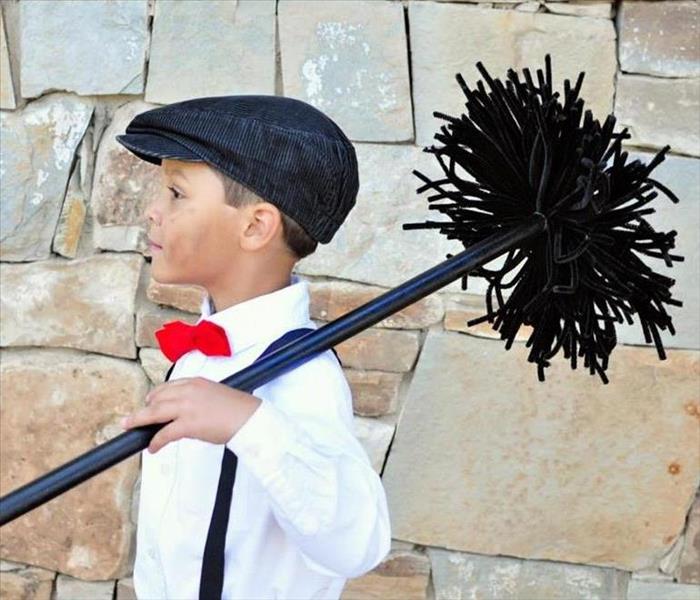 Always be prepared. SERVPRO of Desoto, Tate, & Tunica Counties is here to help.
Always be prepared. SERVPRO of Desoto, Tate, & Tunica Counties is here to help.
At SERVPRO of Desoto, Tate, & Tunica Counties, we know the lovely warm glow a chimney can add to any home. Sitting in front of a fireplace in your Southaven home on a crisp day is a wonderful way to relax and enjoy an evening with family. There is nothing more important than keeping your home and family safe. To help keep those fires going, it's useful to make sure the chimney is periodically cleaned. Chimney cleaning can help a fireplace stay in good shape and reduce the risk of a fire breaking out in your home. Additionally, the chimney allows smoke, fumes and dangerous toxins escape the home through its ventilation. Read on for some helpful tips on having your chimney services.
Inspect the Brick
All chimneys should be completely cleaned at least once a year. Proper cleaning is important to make sure that the chimney is in good working order. Any homeowner should also perform an inspection on their own. This can help identify any potential problems that must be addressed as soon as possible. It's a good idea to bring a flashlight and have a good look at the floor. All the ashes in the chimney accumulate here. The flooring needs to be kept in good shape to make sure the fire can be turned on. Note any problems with the brick surrounding it. The bricks used in a fireplace are more heat tolerant than ordinary bricks. They need to be maintained to prevent any fire in the fireplace from spreading to other areas of the home. If a single brick is out of place, this can make the rest of the chimney far less functional.
Have a Look Up
After having a good look at the area surrounding the fireplace, it's a good idea to have a look at the rest of the chimney. Put on some old clothes and get in the area surrounding the fireplace. Have a look at the chimney area. You should see if there's any obstruction or other issues. Small birds and rodents often find themselves stuck or you could have a thick layer of creosote and soot sticking to the flue and masonry inside the chimney. When this gets too thick, all it takes is a spark and you have a chimney fire on your hands.
According to the National Fire Prevention Association, 30 percent of home fires are caused by chimney fires. Be sure your home is not one of them and have your chimney cleaned regularly.If you do run into trouble with smoke or fire in your home, give us a call today.
SERVPRO of Desoto, Tate, & Tunica Counties - 662-349-6500
Available 24/7
Here to Help!
Fire Damage Process
12/27/2017 (Permalink)
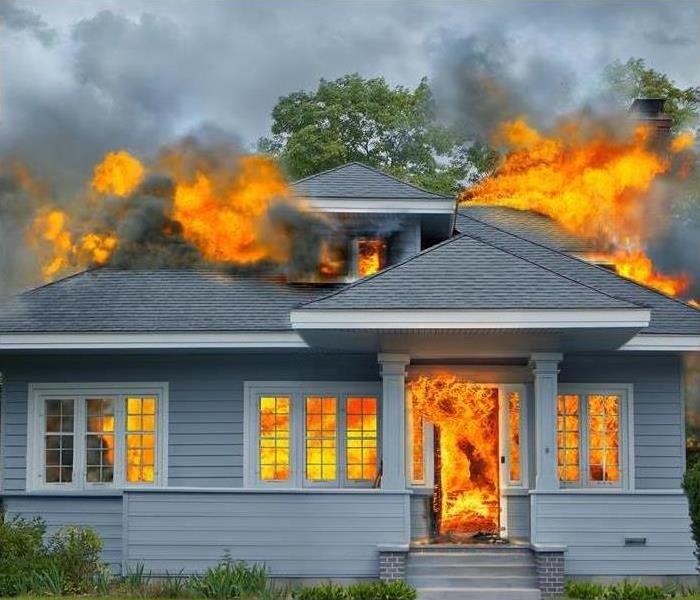 If you are a victim of fire damage, call the professionals at SERVPRO of Desoto, Tate, & Tunica Counties. We are always here to help! 662-349-6500.
If you are a victim of fire damage, call the professionals at SERVPRO of Desoto, Tate, & Tunica Counties. We are always here to help! 662-349-6500.
No matter how the fire started, a rush of emotions and feelings of panic seem to follow. After the calling the Fire Department to put out the fire, who do you call to help you clean up the damage caused by the fire?
SERVPRO of Desoto, Tate & Tunica Counties is here to help you any time, day or night. Here is an overview of our fire damage process:
ONE HOUR: Within one hour from notice of loss, SERVPRO of Desoto, Tate & Tunica Counties will contact you to arrange for service. You'll know help is on the way!
FOUR HOURS: Within four hours of loss notificiation, SERVPRO of Desoto, Tate, & Tunica Counties will be on-site to start mitigation services. The key to reducing damage and saving money is responding quickly to your damage.
DETAILED EXPLANATION: A trained, uniformed and equipped SERVPRO of Desoto, Tate, & Tunica Counties professional will walk you through the job process step-by-step, explaining what to expect and anticipated outcome.
PRETESTING: We will begin pretesting for restorability, working from the source of the damage outward.
EIGHT HOURS: Within eight business hours of on-site arrival, a verbal breifing of the scope will be communicated to the appropriate person, normally your adjuster or property manager.
CLEANING, RESTORATION, & DEODORIZATION: We will work neatly and efficiently to help you regain control of your property when a damaging event has taken over. They will use state-of-the-art restoration techniques to ensure your property is taken care of right the first time.
FINAL WALK-THROUGH: After the work has been completed, a final walk through will be conducted with your to help ensure your satisfaction.
Call us today at SERVPRO of Desoto, Tate, & Tunica Counties at (662) 349-6500 for all of your fire restoration needs.
Holy Smoke!
10/25/2017 (Permalink)
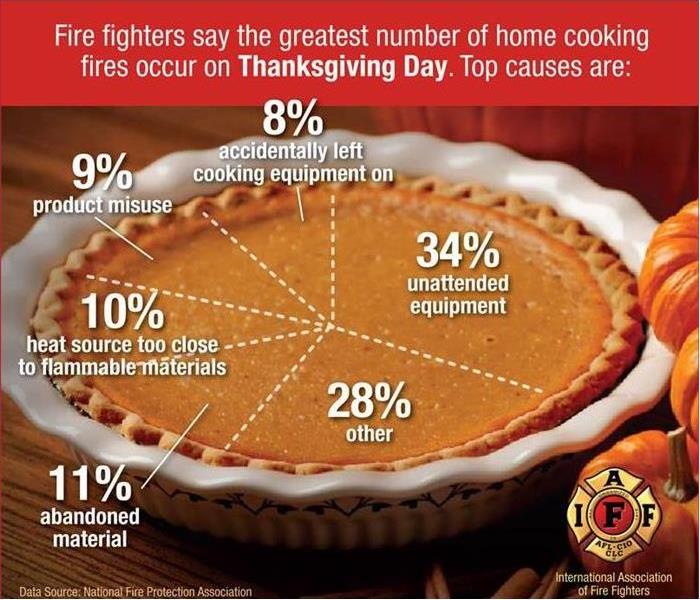 No matter what Holiday you are celebration, SERVPRO of DeSoto, Tate, & Tunica Coutnies is always here to help! 662-349-6500.
No matter what Holiday you are celebration, SERVPRO of DeSoto, Tate, & Tunica Coutnies is always here to help! 662-349-6500.
The holidays are approaching and many families are finalizing plans for elaborate meals, get-together with friends, and decorating with festive lights. Amidst all this planning, SERVPRO of DeSoto, Tate, & Tunica Counties reminds homeowners that they may be overlooking the most important plan they can make—a fire safety plan.
Each year, statistics show the incidence of home cooking and candle fires peaks during the holiday season. This tends to focus homeowners on fire prevention precautions—and that’s a good thing, But to truly protect your family from the dangers of a home fire, at the holidays and throughout the year, you need to start with a fire safety plan. Developing a fire safety plan and practicing it regularly with your family is the most important step you can take to help prevent a house fire from turning into a devastating tragedy.
SERVPRO is a national leader and provider of fire and water cleanup and restoration services, and their disaster response professionals know from experience how devastating a home fire can be. They also know that when fire causes a loss of life, there is no “remediation” possible. This is why SERVPRO has teamed up with the American Red Cross by supporting the ARC Disaster Responder program, and in particular the Home Fire Preparedness Campaign. As a Disaster Responder, SERVPRO pledges dollars and support in advance to help the ARC develop and distribute educational materials and respond immediately when they are needed.
We at SERVPRO encourage all Southaven area homeowners to follow these fire safety guidelines, developed by the ARC through their Home Fire Preparedness Campaign, to help minimize injury or loss of life due to a residential fire.
- Install the right number of smoke alarms4. Test them once a month and replace the batteries at least once a year.
- Teach children what smoke alarms sound like and what to do when they hear one.
- Ensure that all household members know two ways to escape from every room of your home and know the family meeting spot outside of your home.
- Establish a family emergency communications plan and ensure all household members know who to contact if they cannot find one another.
- Practice escaping from your home at least twice a year. Press the smoke alarm test button or yell “Fire” to alert everyone they must get out.
- Make sure everyone knows how to call 9-1-1.
- Teach household members to STOP, DROP and ROLL if their clothes should catch on fire.
Fire prevention and fire safety planning are two very different things. Fire prevention planning helps control or eliminate the causes of a fire. Fire safety planning helps prevent injury and loss of life when a fire does break out. To protect your family and your property, you need both.
For more information please contact us at 662-349-6500.
How to Prevent Fires in Bedrooms
6/14/2017 (Permalink)
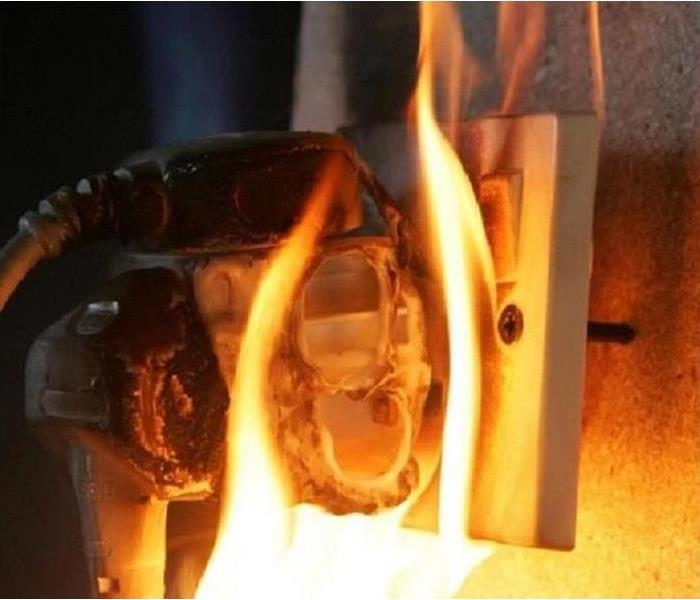 Please let us help you if you are a victim of a fire damage. Call us at SERVPRO of DeSoto, Tate, & Tunica Counties at 662-349-6500
Please let us help you if you are a victim of a fire damage. Call us at SERVPRO of DeSoto, Tate, & Tunica Counties at 662-349-6500
Did you know that half of all home fire deaths occur in bedrooms? That’s also where most electrical fires start too. However, you can easily prevent bedroom fires by following these essential safety tips:
- Don’t run electric cords under the bed or carpeting. Don’t trap cords against a wall where heat can build up. Keep cords untangled to allow heat to dissipate. Never overload an extension cord.
- Always supervise space heaters. Turn them off when leaving the bedroom or going to sleep.
- Install arc fault circuit interrupters (AFCIs) to prevent fires in electrical switches. They shut off the circuit when an unintentional discharge of electricity occurs in the circuit.
- Install tamper resistant receptacles (TRRs) in all rooms if you have children. These devices prevent them from inserting foreign objects like hairpins into the outlet.
- Never put devices that are charging under bedding. Leaving a laptop on the bed can also cause a fire.
- Only use laboratory-approved electric blankets and warmers. Don’t fold them as it may damage the wiring. Never sleep with an electric blanket turned on and regularly check it for overheating.
- Keep flammable objects at least three feet away from heat sources, such as space heaters, candles, and electronics.
- Keep lit candles away from combustible objects like bedding, curtains, and paper. Consider replacing burning candles with battery-operated flameless candles.
- Use only mattresses that meet the 2007 Federal Mattress Standards.
- Don’t smoke in bed — you might fall asleep with a lit cigarette in your hand and it could catch fire. Use fire-safe cigarettes as they extinguish more quickly.
- Install smoke alarms inside and outside each bedroom. Test Smoke Alarms monthly and replace them every 10 years. Replace batteries once a year.
- Create a fire escape plans. Make sure each room has two exits. Practice your home fire drill with everyone in the home at night and during the day twice a year.
For professional fire damage repair or smoke remediation services, contact SERVPRO of DeSoto, Tate, & Tunica Counties today at 662-349-6500.
Smoke Alarm Safety
5/11/2017 (Permalink)
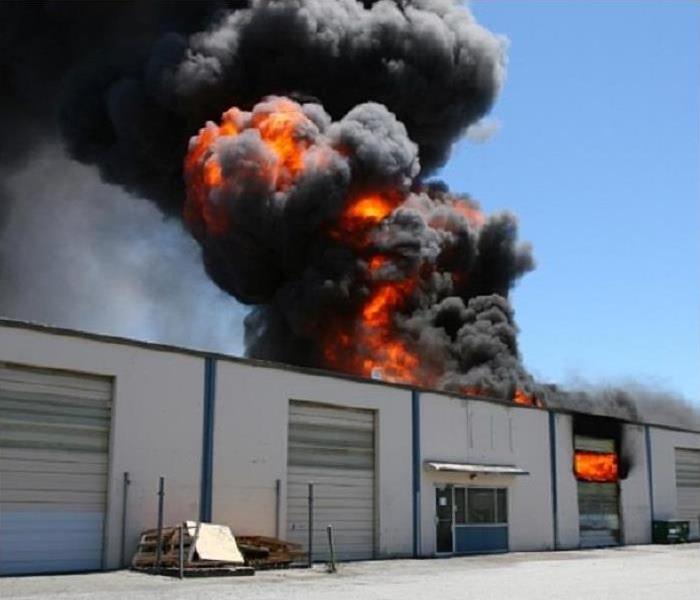 Call the professionals at SERVPRO of DeSoto, Tate, & Tunica Counties at 662-349-6500.
Call the professionals at SERVPRO of DeSoto, Tate, & Tunica Counties at 662-349-6500.
A few Sundays ago we lost an hour of sleep but I think we are finally getting used to it. The longer days are worth it now! This time of year we also are reminded to change the batteries in our smoke alarms. You should also check the manufacturing date on your smoke alarm and replace it if it is over ten years old.
Since half of home fire deaths occurring between the hours of 11 PM- 7 AM a smoke alarm can be the difference between just losing your home and losing your life. For more information on different types of smoke alarms and optimal alarm placement please see https://www.usfa.fema.gov/prevention/technology/.
If you have a fire at your home or business the technicians at SERVPRO of DeSoto, Tate, & Tunica Countites are highly trained in how to handle the cleaning of your home and contents. We will be sympathetic to you because we know that it will be a very stressful time for you. We hope you don't ever need us for a fire loss but if you ever do we will be here for you. Please call us at 662-349-6500.
Understanding The Behavior of Smoke
5/11/2017 (Permalink)
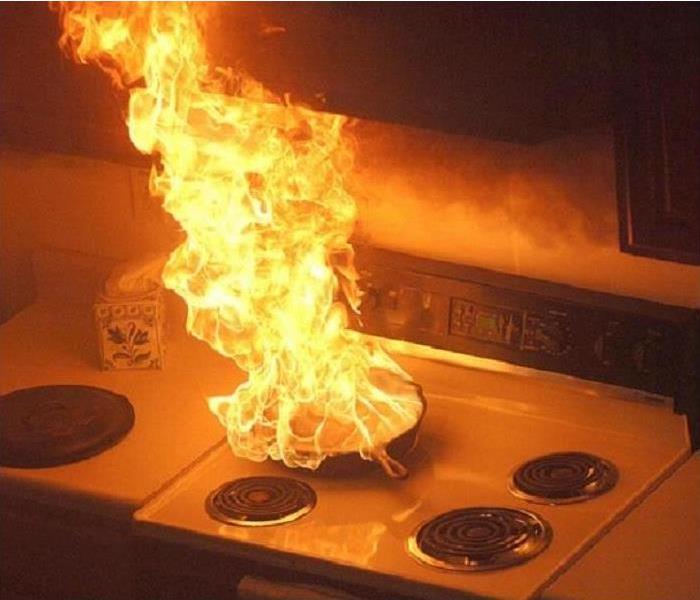 Call the professionals at SERVPRO of DeSoto, Tate, & Tunica Counties for any size fire at your home or business at 662-349-6500.
Call the professionals at SERVPRO of DeSoto, Tate, & Tunica Counties for any size fire at your home or business at 662-349-6500.
Understanding the Behavior of SMOKE
The damage to your property following a fire can often be complicated due to the unique behavior of smoke. There are two different types of smoke-wet and dry. As a result, there are different types of soot residue after a fire. The SERVPRO of DeSoto, Tate, & Tunica Counties Professionals are thoroughly trained in fire cleanup and restoration and know the different types of smoke and their behavior patterns. Knowing this information is vital to proper restoration. Before restoration begins, The SERVPRO of DeSoto, Tate, & Tunica Counties Professionals will survey the loss to determine the extent of impact from fire, smoke, heat, and moisture on the building materials and contents. The soot will then be tested to determine which type of smoke damage occurred. Pretesting determines the proper cleaning method and allows the SERVPRO of DeSoto, Tate, & Tunica Counties Professionals to focus on saving your precious items.
The SERVPRO of DeSoto, Tate, & Tunica Counties Professionals know smoke can penetrate various cavities within the structure, causing hidden damage and odor. Their knowledge of building systems helps them investigate how far smoke damage may have spread. The following are additional facts you may not know about smoke.
- Hot smoke migrates to cooler areas and upper levels of a structure.
- Smoke flows around plumbing systems, seeping through the holes used by pipes to go from floor to floor.
- The type of smoke may greatly affect the restoration process.
Different types of Smoke
- Wet Smoke (Plastic and Rubber) - Low heat, smoldering, pungent odor, sticky, smeary. Smoke webs are more difficult to clean
- Dry Smoke (Paper and Wood) – Fast burning, high temperatures, heat rises therefore smoke rises.
- Protein Fire Residue (Produced by evaporation of material rather than from a fire) – Virtually invisible, discolors paints and varnishes, extreme pungent odor.
- Fuel Oil Soot (Furnace Puff Backs) – While “puff backs” can create havoc for homeowners, SERVPRO Franchise Professionals can, in most cases, restore the contents and structure quickly.
- Other Types (Tear gas, fingerprint powder and fire extinguisher residue) – Special loss situations require special care.
The SERVPRO of DeSoto, Tate, & Tunica Counties Professionals are trained to handle even the toughest losses. If your home or business suffers fire or smoke damage, contact the SERVPRO of DeSoto, Tate, & Tunica Counties Franchise Professionals to help make it “Like it never even happened.”
Fire...the Facts.
5/11/2017 (Permalink)
JUST THE FACTS
ABOUT FIRE
In 2014, fires caused 2745 deaths, 11,825 injuries, and $6.8 Billion in property damage.
Three out of five home fire deaths are caused by fires in homes with no smoke alarms or not working alarms.
Working smoke alarms cut the risk of dying in reported home fires in half.
In fires considered large enough to activate the smoke alarm, hardwired alarms operated 94 percent of the time, while battery powered alarms operated 80 percent of the time.
When smoke alarms fail to operate, it is usually because batteries are missing, disconnected, or dead.
One quarter of home fire deaths are caused by fires that start in the bedroom. Another quarter result from fires in the living room, family room or den.
One-third of survey respondents who made an estimate thought they would have at least 6 minutes before a fire in their home would become life-threatening. The time available is often much less. Only 8 percent said their first thought on hearing a smoke alarm would be to get out.
Facts provided by National Fire Protection Association, nfpa.org
WHAT TO DO UNTIL HELP ARRIVES
DO:
- Limit movement in the home to prevent soot particles from being embedded into upholstery and carpet.
- Keep hands clean. Soot on hands can further soil upholstery, walls and woodwork.
- Place dry, colorfast towels or old linens on rugs, upholstery and carpet traffic areas
- If electricity is off, empty freezer/refrigerator completely and prop doors open to help prevent odor.
- Wipe soot from chrome kitchen/bathroom faucets, trim and appliances, then protect these surfaces with a light coating of lubricant.
- If heat is off during winter, pour RV antifreeze in sinks, toilet bowls, holding tanks and tubs to avoid freezing pipes and fixtures.
- Change HVAC filters; leave system off until a trained professional can check the system.
- Tape double layers of cheesecloth over air registers to stop particles of soot from getting in or out of the HVAC system.
DON’T:
- Don’t attempt to wash any walls or painted surfaces without first contacting your SERVPRO® Franchise Professional.
- Don’t attempt to shampoo carpet or upholstered furniture without first consulting your SERVPRO® Franchise Professional.
- Do not attempt to clean any electrical appliances (TV sets, radios, etc.) that may have been close to fire, heat, or water without first consulting an authorized repair service.
- Do not consume any food or beverages that may have been stored close to fire, heat or water, as they may be contaminated.
- If ceiling is wet, do not turn on ceiling fans. Wiring may be wet or damaged and cause electrical shock, and air movement may create secondary damage.
- Don’t send garments to the dry cleaner. Improper cleaning may set in smoke odor.
Dryer Vents & Fire Protection
4/18/2017 (Permalink)
 Change your dryer vents after every use!!
Change your dryer vents after every use!!
According to FEMA, failure to clean home dryers casues 34% of home dryer fires. Home dryer fires cause $35 Million in property loss and even can cause injury or death. To reduce the risk of these fires happening in your own home or business, SERVPRO can help clean dryer vents and ducts that may have lint buildup.
Other tips for keeping your dryer vents clean from the National Fire Protection Agency include cleaning the lint filter befroe and after each each load, and making sure the outdoor vent flap will openand is not restricted by snow, a birds nest or other potential obsticles.
If your home or business is ever affected by fire or smoke damage due to a dryer fire, call us in for a free estimate. Our trained professionals will work with you and your insurance to asses the damage and come up with a plan to get you back up and running as soon as possible.
When Fire Strikes You
12/29/2016 (Permalink)
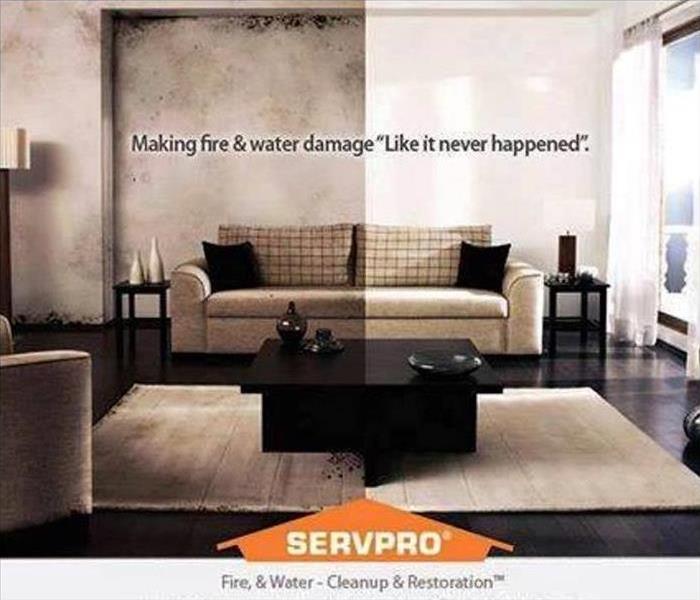 Fires can cause lots of damage...but SERVPRO of DTT can make it "Like it never even happened."
Fires can cause lots of damage...but SERVPRO of DTT can make it "Like it never even happened."
SERVPRO of Desoto, Tate, and Tunica Counties can help you in so many ways if you are a victim of a fire damage in your home or business.
What is Restorable:
Determining exactly what can be saved until everything is dry is usually impossible. We will set a follow-up date so we can monitor the drying process. In addition, the restoration process will be scheduled when the drying is complete. The can include floor preparation, tack strip replacements, carpet and pad installation, seaming, carpet cleaning and restoring, and furniture and contents cleaning. A scope of services will be provided.
Pre-Existing or Preloss Conditions:
During the course of cleaning, it is likely we will remove day-to-day soiling, which existed prior to your loss. We are happy to do so. If, however, the removal of pre-existing soil requires significant extra effort, our crews will be instructed to move on to the next item. Pre-existing damage, including visible mold growth, will also be noted.
Personal Items:
In the course of our survey and cleaning, we will sometimes be required to open doors, cupboards, etc. to qualify and/or restore the damage. If any of these areas contain personal items you would prefer to relocate before we start work, please let us know.
Overlooked Items:
Although our supervisors inspect all work, you should accompany the supervisor on the final walk-through and bring any overlooked items or concerns to the supervisor's attention.
Insurance Adjusters or Agents:
We are neither insurance agents nor adjusters. We cannot authorize anything to be replaced, repaired or painted. Our job is to preserve and protect, stop further damage from occurring and restore damaged items to their prior condition when possible.
Please call SERVPRO of DTT 24/7 in any Fire or Water Emergency at 662-349-6500.
Fire Damage Process
6/14/2016 (Permalink)
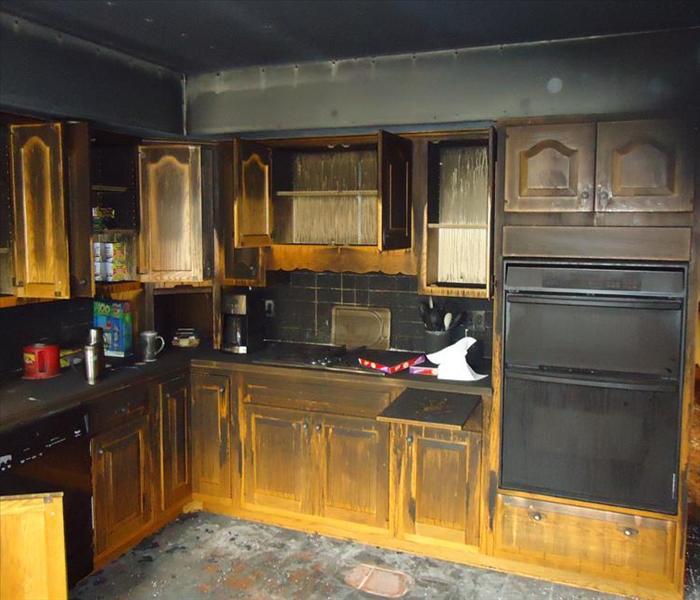 SERVPRO of DTT's goal is to make it...Like it never even happened.
SERVPRO of DTT's goal is to make it...Like it never even happened.
No matter how the fire started, a rush of emotions and feelings of panic seem to follow. After the calling the Fire Department to put out the fire, who do you call to help you clean up the damage caused by the fire?
SERVPRO of DeSoto, Tate, & Tunica Counties is here to help you any time, day or night. Here is an overview of our fire damage process:
ONE HOUR: Within one hour from notice of loss, SERVPRO of DTT will contact you to arrange for service. You'll know help is on the way!
FOUR HOURS: Within four hours of loss notificiation, SERVPRO of DTT will be on-site to start mitigation services. The key to reducing damage and saving money is repsonding quickly to your damage.
DETAILED EXPLANATION: A trained, uniformed and equipped SERVPRO of DTT professional will walk you through the job process step-by-step, explaining what to expect and anticipated outcome.
PRETESTING: We will begin pretesting for restorability, working from the source of the damage outward.
EIGHT HOURS: Within eight business hours of on-site arrival, a verbal breifing of the scope will be communicated to the appropriate person, normally your adjuster or property manager.
CLEANING, RESTORATION, & DEODORIZATION: We will work neatly and efficiently to help you regain control of your property when a damaging event has taken over. They will use state-of-the-art restoration techniques to ensure your property is taken care of right the first time.
FINAL WALK-THROUGH: After the work has been completed, a final walk through will be conducted with your to help ensure your satisfaction.
Call us today at SERVPRO of DTT at (662) 349-6500 for all of your fire restoration needs.
How SERVPRO of DTT Can Help With Your Fire Restoration Services
5/31/2016 (Permalink)
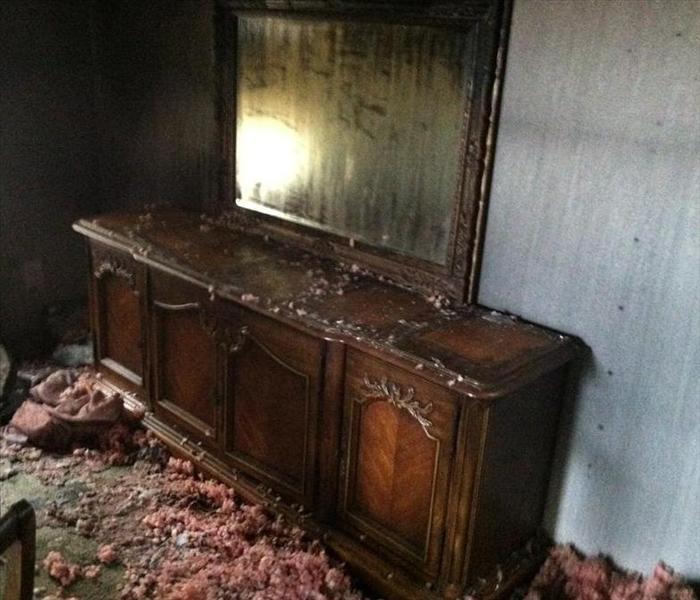 SERVPRO of DTT will make your fire damage "Like it never even happened."
SERVPRO of DTT will make your fire damage "Like it never even happened."
Structure Cleaning
After a smoke or fire damage, ceilings, walls, woodwork, carpeting and floors will often need a thorough cleaning. SERVPRO of Desoto, Tate, & Tunica Counties will pretest to determine the extent of damage, and then use the specific equipment and cleaning products required to clean and protect the different types of surfaces found in your structure. Depending on the amount of soot, SERVPRO of DTT may even be able to reduce the cost of recovery by cleaning lighter soot deposits found on some surfaces, eliminating the expense incurred with repainting or refinishing. In other cases, SERVPRO of Tupelo will clean to "prepare for painting". This process deodorizes and ensures the new paint will adhere properly to the surface.
Contents Cleaning
All of the restorable contents in affected areas will be professionally cleaned and deodorized. This includes area rugs, furniture, draperies and upholstery. SERPVRO of DTT begins by carefully inspecting and testing all fabrics in the structure to determine which cleaning methods are most appropriate. SERVPRO of DTT can provide wet or dry cleaning services. Additionally, all the other restorable contents will be cleaned and deodorized to preloss condition. This includes electronics, art, wood furniture, kitchen items, clothing, bedding, bric-a-brac and much more. Finally, SERVPRO of DTT can provide an inventory list of all "to be claimed" items if requested.
Call us today at (662) 349--6500 and we will make it "Like It Never Even Happened."
Once The Fire Is Out, Who Will Help You Put The Pieces Back Together?
5/27/2016 (Permalink)
 Within 4 hours of loss notification, SERPVRO of DTT will on-site to start mitigation services.
Within 4 hours of loss notification, SERPVRO of DTT will on-site to start mitigation services.
The leading causes of fire in a home include:
- Cooking
- Heating Units
- Electrical
- Smoke
No matter how the fire started, a rush of emotions and feelings of panic seem to follow. After calling the Fire Department to put out the fire, who do you call to help you clean up the damage caused by the fire?
SERVPRO of Desoto, Tate, and Tunica Counties professionals are trained in the cleanup and care of your home and personal belongings following a fire incident. Before attempting to clean up fire damage yourself, call SERVPRO of DTT at (662) 349-6500.
Fire Damage Tips
5/19/2016 (Permalink)
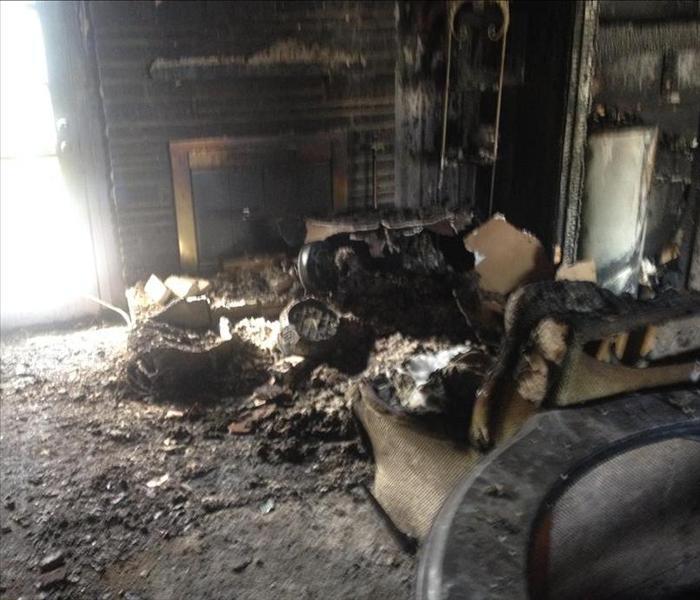 A fire can cause damage to things you many not even see or think! It can be a dangerous situation after all flames have been put out.
A fire can cause damage to things you many not even see or think! It can be a dangerous situation after all flames have been put out.
After any fire damage situation, your primary focus should be safety first:
- Is it safe to stay in the house?
- Electrical and "slip and fall" hazards are some of the most prevalent concerns.
- Only do activities that are safe for you to perform.
- Wet materials can be VERY heavy. Be careful!
Have Smoke or Fire Damage? Call SERVPRO of Desoto, Tate & Tunica Counties at (662) 349-6500
What To Do After A Fire
- Limit movement in the home to prevent soot particles from being embedded into upholstery and carpets.
- Keep hands clean so as not to further soil upholstery, walls and woodwork.
- Place clean towels or old linens on rugs, upholstery and carpet traffic areas.
- If electricity is off, empty freezer and refrigerator and prop doors open.
- Clean and protect chrome with light coating of petroleum jelly or oil.
- Wash houseplants on both sides of leaves.
- Change HVAC filter.
- Tape double layers of cheesecloth over air registers.
What NOT To Do After A Fire
- Don't attempt to wash any walls or painted surfaces or shampoo carpet or upholstery without contacting us.
- Don't attempt to clean any electrical appliances that may have been close to fire, heat or water without consulting an authorized repair service.
- Don't use any canned or packaged food or beverages that may have been stored near the fire, heat or water.
- Don't turn on ceiling fixtures if ceiling is wet. The wiring may be damaged.
- Don't send garments to an ordinary dry cleaner. Improper cleaning may set smoke odor.
Fire Damage from Kitchen Fires in Senatobia, MS
5/6/2016 (Permalink)
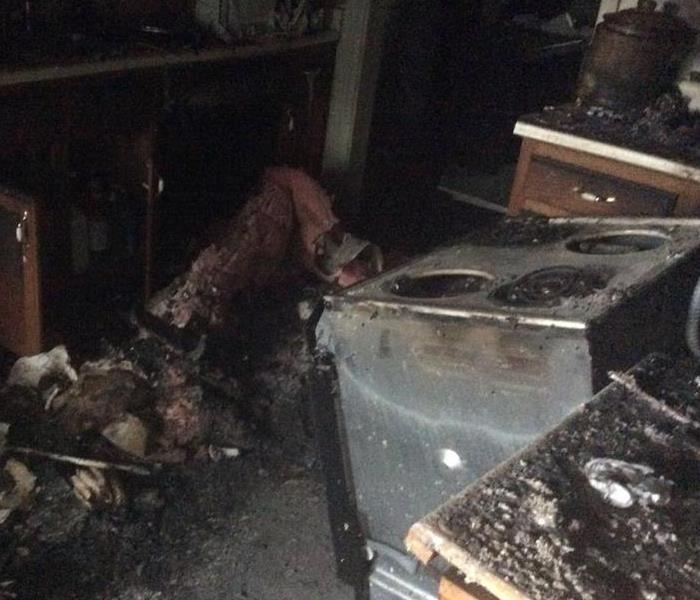 Fire damage from a kitchen fire in Senatobia, MS
Fire damage from a kitchen fire in Senatobia, MS
Statistics show that 2 out of every 5 fires begin in the kitchen. SERVPRO of Desoto,Tate, and Tunica Counties has a lot of experience working with fire damage and restoring customers homes "Like it never even happened".
Just last week we helped a customer in Senatobia, MS that was a victim to a kitchen fire at their home. This is a terrible time for anyone to have to go through, but letting SERVPRO of DTT helps to take the worry and stress away, especially in the beginning stages of this traggic event.
Here are tips from the American Red Cross to Avoid Cooking Fires:
1. Never leave cooking food unattended – stay in the kitchen when frying, grilling or broiling food. If you have to leave the kitchen, even for a second, turn off the stove.
2. Check your food regularly while cooking and remain in the home while cooking.
3. Use a timer so you’ll remember that the stove or oven is on.
4. Don’t wear loose clothing or dangling sleeves while cooking.
5. Keep the kids away from the cooking area. Enforce a “kid-free zone” and make them stay at least three feet away from the stove.
6. Keep anything that can catch fire - pot holders, oven mitts, wooden utensils, paper or plastic bags, food packaging, and towels or curtains—away from your stove, oven or any other appliance in the kitchen that generates heat.
7. Clean cooking surfaces on a regular basis to prevent grease buildup.
8. Consider purchasing a fire extinguisher to keep in your kitchen. Contact your local fire department to take training on the proper use of extinguishers.]
9. Always check the kitchen before going to bed or leaving the home to make sure all stoves, ovens, and small appliances are turned off.
10. Install a smoke alarm near your kitchen, on each level of your home, near sleeping areas, and inside and outside bedrooms if you sleep with doors closed. Use the test button to check it each month. Replace all batteries at least once a year.
We hope you and your family never has to experience a fire damage in your home, but if you do please call SERVPRO of DTT at (662) 349-6500 24 hours a day, 7 days a week!
Safety Tips for Using a Space Heater
2/10/2016 (Permalink)
Space heaters, though beloved for the warmth they provide, can be extremely dangerous if not used properly. Make sure you are keeping your family safe.
1. Place heater on a hard, level surface.
2. Turn it off when you leave.
3. Keep 3 ft. from nearest object.
4. Avoid using extension cords.
Electrical fire
2/3/2016 (Permalink)
A commercial business in Olive Branch, MS had an electrical fire on Monday. SERVPRO of Desoto, Tate, & Tunica has been onsite cleaning all week to assure the business can be up & running soon.
Smoke damage
1/18/2016 (Permalink)
SERVPRO of Desoto, Tate, & Tunica has been busy at Sue's home in Walls, MS. She had a fire last night that was quickly put out, but it did cause smoke damage. The professional technicians have began the fire mitigation & hope to have her back in her home soon.
Grease fire in kitchen
1/14/2016 (Permalink)
Kay in Potts Camp called SERVPRO of Desoto, Tate, & Tunica today in need of services. Her home had caught on fire due to a grease fire. Even under the untimely circumstance, she was very pleased with how professional the technicains were and the excellent job they had began.
Smoke damage
1/12/2016 (Permalink)
SERVPRO of Desoto, Tate, & Tunica was busy cleaning up after a fire damaged a customer's home in Olive Branch, MS during the night. It is still unknown what may have caused the fire, but the professional technicians have began the fire mitigation process.
Grease fire in kitchen
11/3/2015 (Permalink)
A customer in Lake Cormorant, MS had a fire last night & tried to put it out with water. They were so thankful when SERVPRO of Desoto, Tate, & Tunica arrived to begin the fire/water mitigation process.
Fire in an apartment building
10/16/2015 (Permalink)
The professional technicians have been on site doing at a commercial fire in Southaven, MS today. An apartment caught on fire upstairs & collapsed onto another apartment. It's been a huge task, but the highly trained technicians have been making progress & have began the fire restoration.
Kitchen fire
9/25/2015 (Permalink)
A customer in Robinsville, MS called stating she had a house fire that began in the kitchen during the night and was unsure of where to begin. SERVPRO of Desoto, Tate, & Tunica has been on the scene all day to cleaning up the destruction.
Smoke damage
9/15/2015 (Permalink)
A customer from Tunica, MS called stating he had smoke damage due to gas logs. SERVPRO of Desoto, Tate, & Tunica has responded to begin the fire restoration process so the homeowner can relax in a healthy environment.
Fire Restoration
9/8/2015 (Permalink)
A customer in Memphis, TN called with a residential fire over the weekend. SERVPRO of Desoto, Tate, & Tunica responded within in less than 2 hours to begin the fire restoration process.

 24/7 Emergency Service
24/7 Emergency Service
